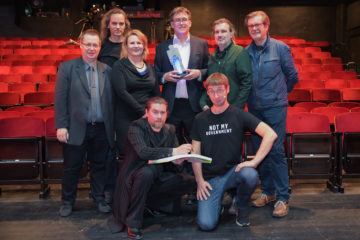How I Learned to Stop Reinventing and Love the Wheels
or having FUN with (home/hackerspace) robotics
An introduction to the Robot Operating System (ROS) for the home/hackerspace roboticist (if it physically interacts with the world through code, call it robot).
All large, feature-rich and complex frameworks suck. True, but too short for a talk. Therefore the talk tries to make a point on why one should still us these frameworks (for robotics). At least so, if one wants to have fun with (home/hackerspace) robotics and do something cool, instead of getting stuck at the usual „trivial“ (or low-level, sounds less judging) capabilities.
In order to build robots one needs at least a basic understanding of mechanics, electronics and computer science. Obviously, more advanced robot features in each area, depend on more advanced roboticist skills – and equipment … and money. The growing community of makers, the proliferation of hackerspaces (cooperators, equipment!) and highly useful consumer devices lessen the hardware related challenges. On the other hand, state-of-the-art open-source robotics software has been available for quite a few years already. Unfortunately, it is still somewhat neglected by the extended, i. e. non-academic, robotics community. The mindset and prejudices of too many hackerspace natives is opposed to using preexisting frameworks, especially large ones, in favor of starting from scratch. Bloat, ugly APIs, deprecated programming styles and of course bad code conventions … good and good enough reasons to start over (I confess, too!). As a result many projects never get beyond the point of „finally fixed the bug by reflashing the microcontroller with code that sets register bar42=0xf00, now it moves – sort of“.
The famous „Re-inventing the Wheel“ comic (http://www.willowgarage.com/sites/def…) posted by Willow Garage in 2010, does tell the life cycle of robotics in the PhD world, but not only that. Rather, unfortunately, it pertains to robotic and closely related projects in general.
So in a nutshell, yet another ‚Introduction to ROS‘ talk? Yes, an introduction to the Robot Operating System (ROS).
However, for once without leaving behind the impression (in the hobbyists mind) that this is all cool stuff, but what to do with it when not owning a 100K dollar robot.
The goal is to show a few basics (the Plumbing), as many of the tools and capabilities as time permits and a few words about the people side of things.
(http://www.ros.org/wp-content/uploads…)
Should the robot visually perceive the world? ROS + Webcam(s) / Kinect / Xtion. Hello, out of the box drivers, calibration, point clouds and object recognition.
Should the robot drive around and navigate in the environment? ROS + Navigation stack. Hello, out of the box SLAM.
Should the robot reach out and grasp something? ROS + MoveIt!. Hello, out of the box collision-free motion planning.
Should the robot brain be distributed across multiple computers without changing a line of code? ROS. Hello, out of the box usable(!) middleware.
Should the robot builders be able to create independent, yet compatible modules? ROS. Hello, out of the box modularity (well ok – at least kind of).
Should the robot’s world be easily understandable through interactive visualizations? ROS + Rviz / rqt. Hello, out of the box advanced 3D visualization for many types of data.
Is this an advertisement? Yes, for great open source software – to make each of your lines of code do more _interesting_ stuff. Hello ROS world.
──────────
➤Speaker: Andreas Bihlmaier
➤EventID: 6077
➤Event: 31th Chaos Communication Congress [31c3] of the Chaos Computer Club [CCC]
➤Location: Congress Centrum Hamburg (CCH); Am Dammtor; Marseiller Straße; 20355 Hamburg; Germany
➤Language: english
➤Begin: Sat, 12/27/2014 16:00:00 +01:00
➤License: CC-by
Kategorie
Bildung
Lizenz
Creative Commons-Lizenz mit Quellenangabe (Wiederverwendung erlaubt)
Playlist / Bonustrack:
– Rammelhof – Wladimir (Put Put Putin)
– Alexander Marcus – Hundi












